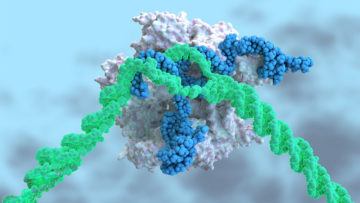Jocelyn Kaiser in Science:

The gene editor CRISPR excels at fixing disease mutations in lab-grown cells. But using CRISPR to treat most people with genetic disorders requires clearing an enormous hurdle: getting the molecular scissors into the body and having it slice DNA in the tissues where it’s needed. Now, in a medical first, researchers have injected a CRISPR drug into the blood of people born with a disease that causes fatal nerve and heart disease and shown that in three of them it nearly shut off production of toxic protein by their livers.
Although it’s too soon to know whether the CRISPR treatment will ease the symptoms of the disease, known as transthyretin amyloidosis, the preliminary data reported today are generating excitement about what could be a one-time, lifelong treatment. “These are stunning results,” says gene editing researcher and cardiologist Kiran Musunuru of the University of Pennsylvania, who was not involved in the trial. “It exceeds all my expectations.”
The work also marks a milestone for the race to develop treatments based on messenger RNA (mRNA), the protein-building instructions naturally made by cells. Synthetic mRNAs power two COVID-19 vaccines being given to millions of people to fight the coronavirus pandemic, and many companies are working on other mRNA vaccines and drugs. The new treatment, which includes an mRNA encoding one of CRISPR’s two components, “begins the convergence of the fields of CRISPR and mRNA,” says cardiovascular researcher Kenneth Chien of the Karolinska Institute, a co-founder of Moderna, which makes one of the COVID-19 vaccines and is also developing mRNA drugs.
More here.
